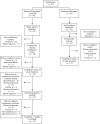Paclitaxel/carboplatin with or without sorafenib in the first-line treatment of patients with stage III/IV epithelial ovarian cancer: a randomized phase II study of the Sarah Cannon Research Institute
- PMID: 25556916
- PMCID: PMC4430260
- DOI: 10.1002/cam4.376
Paclitaxel/carboplatin with or without sorafenib in the first-line treatment of patients with stage III/IV epithelial ovarian cancer: a randomized phase II study of the Sarah Cannon Research Institute
Abstract
This trial compared the efficacy and toxicity of standard first-line treatment with paclitaxel/carboplatin versus paclitaxel/carboplatin plus sorafenib in patients with advanced ovarian carcinoma. Patients with stage 3 or 4 epithelial ovarian cancer with residual measurable disease or elevated CA-125 levels after maximal surgical cytoreduction were randomized (1:1) to receive treatment with paclitaxel (175 mg/m(2) , 3 h infusion, day 1) and carboplatin (AUC 6.0, IV, day 1) with or without sorafenib 400 mg orally twice daily (PO BID). Patients were reevaluated for response after completing 6 weeks of treatment (two cycles); responding or stable patients received six cycles of paclitaxel/carboplatin. Patients receiving the sorafenib-containing regimen continued sorafenib (400 PO BID) for a total of 52 weeks. Eighty-five patients were randomized and received treatment.Efficacy was similar for patients receiving paclitaxel/carboplatin/sorafenib versus paclitaxel/carboplatin: overall response rates 69% versus 74%; median progression-free survival 15.4 versus 16.3 months; 2 year survival 76% versus 81%. The addition of sorafenib added substantially to the toxicity of the regimen; rash, hand-foot syndrome, mucositis, and hypertension were significantly more common in patients treated with sorafenib. The addition of sorafenib to standard paclitaxel/carboplatin did not improve efficacy and substantially increased toxicity in the first-line treatment of advanced epithelial ovarian cancer. Based on evidence from this study and other completed trials, sorafenib is unlikely to have a role in the treatment of ovarian cancer.
Keywords: Carboplatin; first-line therapy; ovarian cancer; paclitaxel; sorafenib.
© 2014 The Authors. Cancer Medicine published by John Wiley & Sons Ltd.
Figures



References
-
- Ozols RF, Bundy BN, Greer BE, Fowler JM, Clarke-Pearson D, Burger RA, et al. Phase II trial or carboplatin and paclitaxel compared with cisplatin and paclitaxel in patients with optimally resected stage II ovarian cancer: a Gynecologic Oncology Group Study. J. Clin. Oncol. 2003;21:3194–3200. - PubMed
-
- du Bois A, Luck HJ, Meier W, Adams HP, Mobus V, Costa S, et al. A randomized clinical trial of cisplatin/paclitaxel vs carboplatin/paclitaxel as first-line treatment of ovarian cancer. J. Natl. Cancer Inst. 2003;95:1320–1330. - PubMed
-
- Ferrara N. Molecular and biologic properties of vascular endothelial growth factor. J. Mol. Med. 1999;77:527–543. - PubMed
-
- Alvarez AA, Krigman HR, Whitaker RS, Dodge RK. Rodriguez GC. The prognostic significance of angiogenesis in epithelial ovarian carcinoma. Clin. Cancer Res. 1999;5:587–591. - PubMed
-
- Gasparini G, Bonoldi E, Viale G, Verderio P, Boracchi P, Panizzoni GA, et al. Prognostic and productive value of tumour angiogenesis in ovarian carcinomas. Int. J. Cancer. 1996;69:205–211. - PubMed
Publication types
MeSH terms
Substances
LinkOut - more resources
Full Text Sources
Other Literature Sources
Medical
Research Materials
Miscellaneous

